(完整版)人教版九年级英语第十三单元知识点总结.docx
人教版九年级英语unit13知识点归纳
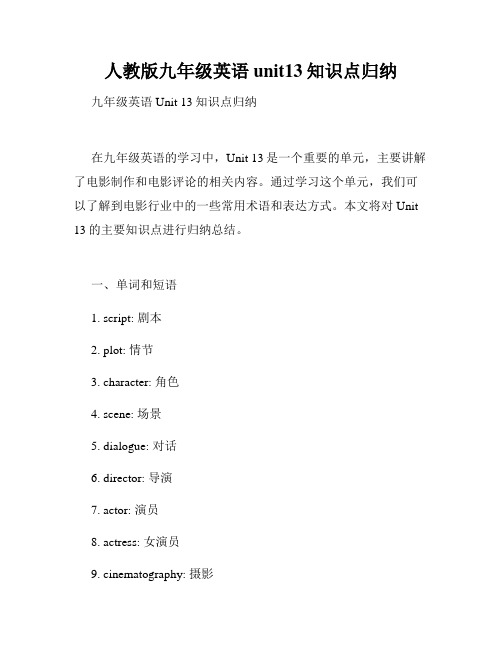
人教版九年级英语unit13知识点归纳九年级英语Unit 13知识点归纳在九年级英语的学习中,Unit 13是一个重要的单元,主要讲解了电影制作和电影评论的相关内容。
通过学习这个单元,我们可以了解到电影行业中的一些常用术语和表达方式。
本文将对Unit 13的主要知识点进行归纳总结。
一、单词和短语1. script: 剧本2. plot: 情节3. character: 角色4. scene: 场景5. dialogue: 对话6. director: 导演7. actor: 演员8. actress: 女演员9. cinematography: 摄影10. special effects: 特效11. soundtrack: 配乐12. box office: 票房13. premiere: 首映式14. sequel: 续集15. genre: 类型二、句型和语法1. 形容词比较级和最高级:例如"The film is more interesting than I expected."和"This is the best movie I've ever seen."2. 定语从句:例如"The actor who played the main character did a great job."3. 被动语态:例如"The film was directed by a famous filmmaker."4. 特殊疑问句:例如"What do you think of the actress in the movie?"5. 宾语从句:例如"He asked me what I thought of the film."三、听力技巧1. 听清语音:要注意区分不同的发音,特别是元音和辅音的区别。
人教版九年级英语(全一册)Unit13_单元语法知识归纳汇总
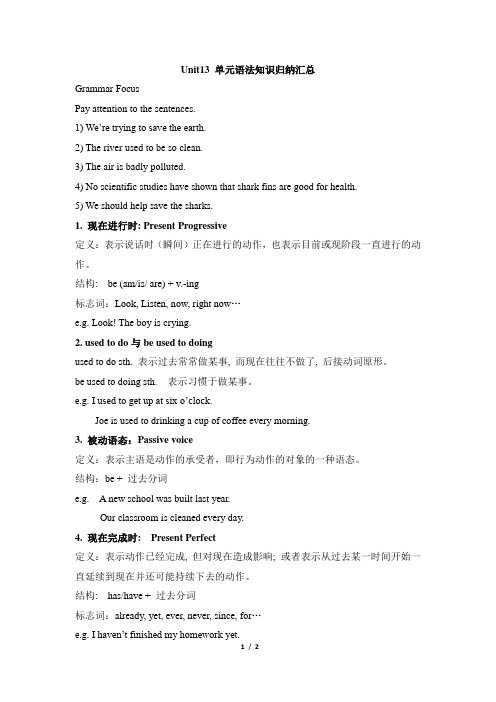
Unit13 单元语法知识归纳汇总Grammar FocusPay attention to the sentences.1) We’re trying to save the earth.2) The river used to be so clean.3) The air is badly polluted.4) No scientific studies have shown that shark fins are good for health.5) We should help save the sharks.1. 现在进行时: Present Progressive定义:表示说话时(瞬间)正在进行的动作,也表示目前或现阶段一直进行的动作。
结构: be (am/is/ are) + v.-ing标志词:Look, Listen, now, right now…e.g. Look! The boy is crying.2. used to do与be used to doingused to do sth. 表示过去常常做某事, 而现在往往不做了, 后接动词原形。
be used to doing sth. 表示习惯于做某事。
e.g. I used to get up at six o’clock.Joe is used to drinking a cup of coffee every morning.3. 被动语态:Passive voice定义:表示主语是动作的承受者,即行为动作的对象的一种语态。
结构:be + 过去分词e.g. A new school was built last year.Our classroom is cleaned every day.4. 现在完成时: Present Perfect定义:表示动作已经完成, 但对现在造成影响; 或者表示从过去某一时间开始一直延续到现在并还可能持续下去的动作。
人教版九年级全一册英语Unit13单元语法知识点总结

人教版九年级全一册英语Unit13单元语法知识点总结本单元重点短语的具体用法1. at the bottom of the river:用于描述某物在河床底部的位置。
例如:The coin was found at the bottom of the river.(硬币在河床底部被发现。
)2. be full of the rubbish:表示充满了垃圾。
例如:The park is full of rubbish.(公园里充满了垃圾。
)3. throw litter into the river:意思是把垃圾扔入河中,用于描述一种不环保的行为。
例如:It's not good to throw litter into the river.(把垃圾扔入河中是不好的行为。
)4. play a part in cleaning it up:表示参与或在清理某物方面发挥作用。
例如:Everyone should play a part in cleaning up the environment.(每个人都应该参与清理环境。
)5. land pollution:指土地污染。
例如:Land pollution is a serious problem.(土地污染是一个严重的问题。
)6. fill the air with black smoke:用于描述使空气中充满黑烟的情况。
例如:The factory fills the air with black smoke.(工厂使空气中充满了黑烟。
)7. cut down air pollution:意思是减少空气污染。
例如:We need to cut down air pollution to protect our health.(我们需要减少空气污染来保护我们的健康。
)8. make a difference:表示产生影响或有所作为。
例如:Small actions can make a big difference.(小行动可以产生大影响。
人教版九年级英语Unit13单词、课文,知识梳理,词汇句式精讲

人教版九年级英语Unit13单词、课文/知识梳理/词汇句式精讲Unit13 单词litter[litə(r)]v. 乱扔n. 垃圾;废弃物bottom[bɔtəm]n.底部;最下部fisherman[fiʃə(r)mən]n. 渔民;钓鱼的人coal[kəul]n. 煤;煤块public[p ʌblik]adj. 公众的;公共的n. 民众;百姓ugly[ ʌgli]adj. 丑陋的;难看的advantage[ ədva:ntidʒ]n. 优点;有利条件cost[kɔst; kɔ:st]v. 花费n. 花费;价钱wooden[wudn]adj. 木制的;木头的plastic[plæstik]adj. 塑料的n. 塑料;塑胶make a difference有关系,作用,影响shark[ ʃa:(r)k]n. 鲨鱼fin[fin]n.(.鱼)鳍cut off割掉;砍掉method[meθəd]n. 方法;措施cruel[kru:əl]adj. 残酷的;残忍的harmful[ha:(r)mfl]adj. 有害的chain[tʃein]n. 链子;链条ecosystem[i:kəusistəm]n.生态系统low[ləu[ a(.数量等)减少的;低的;矮的industry[indəstri]n. 工业;行业law[lɔ:]n. 法律;法规reusable[ri:ju:zəbl]adj.可重复使用的;可再次使用的afford[əfɔ:(r)d]v. 承担得起(后果);买得起transportation[t ænspɔ:(r)teiʃn]n. 运输业;交通运输recycle[ri:saikl]v. 回收利用;再利用napkin[næpkin]n. 餐巾;餐巾纸upside down颠倒;倒转gate[geIt]n. 大门bottle[bɔtl]n. 瓶;瓶子president[prezidənt]n. 负责人;主席;总统inspiration[inspəreiʃn]n. 灵感;鼓舞人心的人(或事物)metal[metl]n. 金属creativity[kri:eitivəti]n. 创造力;独创性WildAid[waildeid]野生救援协会(美国)WWF(World Wide Fund For Nature) 世界自然基金会Mark[ma:(r)k]马克(男名)Jason[dʒeisən]贾森(男名)Ken [ken]肯(男名)Hayes [heiz]海斯(姓)Jessica[dʒesikə]杰茜卡(女名)Unit13 知识梳理【重点短语】1. at the bottom of the river 在河床底部2. be full of the rubbish 充满了垃圾3. throw litter into the river 把垃圾扔入河中4. play a part in cleaning it up 尽一份力把它清理干净5. land pollution 土地污染6. fill the air with black smoke 使空气中充满了黑烟7. cut down air pollution 减少空气污染8. make a difference 产生影响17. take action 采取行动18. turn off 关掉19. pay for 付费20. add up 累加21. use public transportation 使用公共交通22. recycle books and paper 回收书和废纸23. use paper napkins 使用纸巾24. turn off the shower 关掉喷头25. ride in cars 开车出行【重点句型】1.Even the bottom of the river was full of rubbish.即使河底都充满垃圾。
人教新目标英语九年级全册 Unit 13 Were trying to save the earth 单元语法知识归纳汇总-教育文档
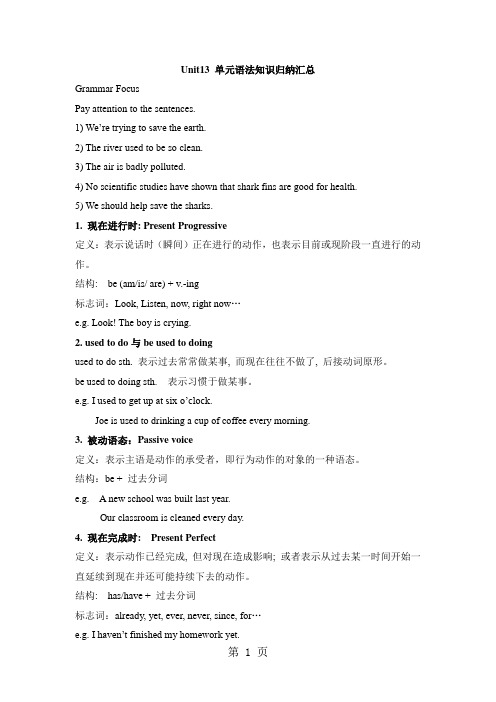
Unit13 单元语法知识归纳汇总Grammar FocusPay attention to the sentences.1) We’re trying to save the earth.2) The river used to be so clean.3) The air is badly polluted.4) No scientific studies have shown that shark fins are good for health.5) We should help save the sharks.1. 现在进行时: Present Progressive定义:表示说话时(瞬间)正在进行的动作,也表示目前或现阶段一直进行的动作。
结构: be (am/is/ are) + v.-ing标志词:Look, Listen, now, right now…e.g. Look! The boy is crying.2. used to do与be used to doingused to do sth. 表示过去常常做某事, 而现在往往不做了, 后接动词原形。
be used to doing sth. 表示习惯于做某事。
e.g. I used to get up at six o’clock.Joe is used to drinking a cup of coffee every morning.3. 被动语态:Passive voice定义:表示主语是动作的承受者,即行为动作的对象的一种语态。
结构:be + 过去分词e.g. A new school was built last year.Our classroom is cleaned every day.4. 现在完成时: Present Perfect定义:表示动作已经完成, 但对现在造成影响; 或者表示从过去某一时间开始一直延续到现在并还可能持续下去的动作。
人教新目标九年级英语Unit13知识点总结复习(Word版)
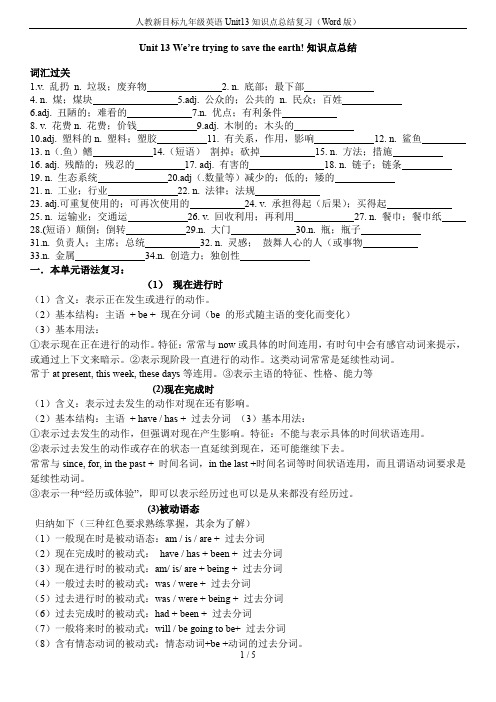
Unit 13 W e’re trying to save the earth!知识点总结词汇过关1.v. 乱扔n. 垃圾;废弃物2. n. 底部;最下部4. n. 煤;煤块5.adj. 公众的;公共的n. 民众;百姓6.adj. 丑陋的;难看的7.n. 优点;有利条件8. v. 花费n. 花费;价钱9.adj. 木制的;木头的10.adj. 塑料的n. 塑料;塑胶11. 有关系,作用,影响12. n. 鲨鱼13. n(.鱼)鳍14.(短语)割掉;砍掉15. n. 方法;措施16. adj. 残酷的;残忍的17. adj. 有害的18. n. 链子;链条19. n. 生态系统20.adj(.数量等)减少的;低的;矮的21. n. 工业;行业22. n. 法律;法规23. adj.可重复使用的;可再次使用的24. v. 承担得起(后果);买得起25. n. 运输业;交通运26. v. 回收利用;再利用27. n. 餐巾;餐巾纸28.(短语)颠倒;倒转29.n. 大门30.n. 瓶;瓶子31.n. 负责人;主席;总统32. n. 灵感;鼓舞人心的人(或事物33.n. 金属34.n. 创造力;独创性一.本单元语法复习:(1)现在进行时(1)含义:表示正在发生或进行的动作。
(2)基本结构:主语+ be + 现在分词(be 的形式随主语的变化而变化)(3)基本用法:①表示现在正在进行的动作。
特征:常常与now或具体的时间连用,有时句中会有感官动词来提示,或通过上下文来暗示。
②表示现阶段一直进行的动作。
这类动词常常是延续性动词。
常于at present, this week, these days等连用。
③表示主语的特征、性格、能力等(2)现在完成时(1)含义:表示过去发生的动作对现在还有影响。
(2)基本结构:主语+ have / has + 过去分词(3)基本用法:①表示过去发生的动作,但强调对现在产生影响。
人教版九年级unit13知识点
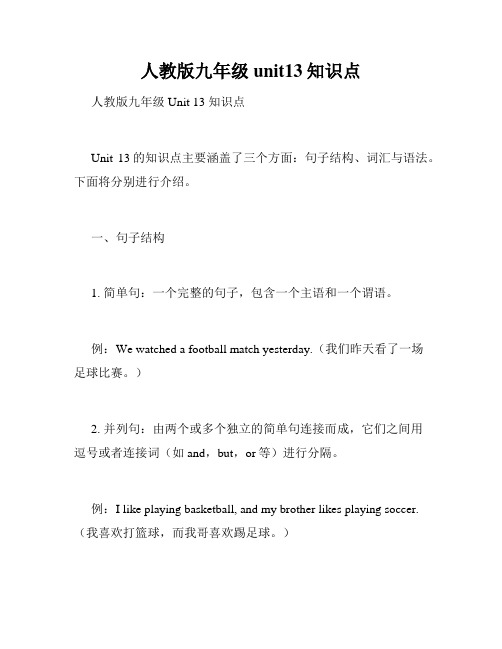
人教版九年级unit13知识点人教版九年级Unit 13 知识点Unit 13的知识点主要涵盖了三个方面:句子结构、词汇与语法。
下面将分别进行介绍。
一、句子结构1. 简单句:一个完整的句子,包含一个主语和一个谓语。
例:We watched a football match yesterday.(我们昨天看了一场足球比赛。
)2. 并列句:由两个或多个独立的简单句连接而成,它们之间用逗号或者连接词(如and,but,or等)进行分隔。
例:I like playing basketball, and my brother likes playing soccer.(我喜欢打篮球,而我哥喜欢踢足球。
)3. 复合句:一个完整的句子,由一个或多个主句和一个或多个从句组成。
例:Although it was raining, we still went hiking.(虽然下雨了,但我们还是去爬山了。
)二、词汇1. 人称代词:第一人称(I,we),第二人称(you),第三人称(he,she,it,they)。
例:He is my best friend.(他是我最好的朋友。
)2. 形容词:用于描述名词或代词的特征或属性。
例:The beautiful flowers are in bloom.(美丽的花儿已经开放了。
)3. 副词:修饰动词、形容词或其他副词,用于表示时间、地点、原因等。
例:She runs very fast.(她跑得非常快。
)4. 动词:表示动作、状态或存在的词。
例:They are swimming in the pool.(他们正在游泳池里游泳。
)三、语法1. 一般现在时:表示经常性或习惯性的动作。
例:I always go to bed early.(我总是早睡。
)2. 一般过去时:表示过去发生的动作或状态。
例:She finished her homework last night.(她昨晚完成了她的作业。
人教版九年级第十三单元知识点

Unit13We’re trying to save the earth!重点单词litter v. 乱扔n. 垃圾;废弃物bottom n. 底部;最下部fisherman n. 渔民;钓鱼的人coal n. 煤;煤块ugly adj. 丑陋的;难看的advantage n. 优点;有利条件cost v. 花费n. 花费;价钱wooden adj. 木制的;木头的plastic adj. 塑料的n. 塑料;塑胶cruel adj. 残酷的;残忍的harmful adj. 有害的industry n. 工业;行业law n. 法律;法规scientific adj. 科学上的;科学的afford v. 承担得起(后果);买得起recycle v. 回收利用;再利用gate n. 大门bottle n. 瓶子president n. 负责人;主席;总统work n.(音乐、艺术)作品metal n. 金属重点短语1. be harmful to 对……有害2. at the top of 在……顶部或顶端3. take part in 参加4. turn off 关掉5. pay for 付费;付出代价6. take action 采取行动7. throw away 扔掉;抛弃8. put sth. to good use 好好利用某物9. pull…down 拆下;摧毁10. upside down 上下颠倒;倒转11. bring back 恢复;使想起;归还重点句型1. She lives in a house in the UK that she built herself out of rubbish.她住在英国,房子是她自己用废弃物建造而成。
that she built…是一个定语从句,修饰前面的名词house。
2. Not only can the art bring happiness to others,but it also shows that even cold,hard iron can be brought back to life with a little creativity.艺术不但可以给他人带来快乐,而且也说明只需要一点创造力,即便是冰冷、坚硬的铁也可产生活力。
- 1、下载文档前请自行甄别文档内容的完整性,平台不提供额外的编辑、内容补充、找答案等附加服务。
- 2、"仅部分预览"的文档,不可在线预览部分如存在完整性等问题,可反馈申请退款(可完整预览的文档不适用该条件!)。
- 3、如文档侵犯您的权益,请联系客服反馈,我们会尽快为您处理(人工客服工作时间:9:00-18:30)。
人教版九年级英语第十三单元知识点总结Unit13.We ’re trying to save the earth!一.单词litter bottom fisherman coal ugly advantage cost wooden plastic takeaway bin shark fin cruel harmful be harmful to at the top of chain the food chain ecosystem industry law scientific take part in afford turn off reusable pay for take action transportation recycle napkin throw away putsth to good use pull...down upside gate bottle president inspiration iron work metal bring back creativity二. 1.现在进行时定义:表示说话时(瞬间)正在进行的动作,也表示目前或现阶段一直进行的动作。
结构 : ①肯定句 : 主语+ am/is/are + V-ing②否定句 : 主语+ am/is/are + not + V-ing③疑问句 : Am/Is/Are +主语+ V-ing用法: 1)表示说话时正在进行的,目前正在发生的动作。
①Look! The big bird is flying away. ② He is watching a movie now.2)表示目前一段时间内正在进行,但说话时可能没有进行的动作。
Right now I am studying Chinese by distance learning.我现在正通过远程教育学习汉语。
1) 2) 常带有表示目前时刻的时间副词 , 如: now, right now, at the (very) moment, for the time being, at present, these days 及 Look! Listen! ...3)与 always, constantly, forever, all the time 等副词连用,表示动作反复或习惯。
此时句子常含有说话者的强烈情感在内。
表达较强的“责备”或“表扬”之意① You are always changing your mind. 你总是主意不定。
(太烦人了 )② He is always helping others. 他总是帮助别人。
(他真是个好人 )4)对于 come, go, leave, arrive, start,fly,drive 等表示位置移动的动词常可用进行时态表将来。
① He is leaving on Wednesday.② Mary isn’there at the moment. She is coming later.ed to do 见第四单元及 use 用法3.被动语态见第五单元注意:接双宾语的词的被动语态;make /let /have sb do的被动语态;see/ hear /notice /find/observe sb do的被动语态;It’ssaid/reported/believed/supposed/well-known;及无被动语态的三种情况(感官动词、不及物动词、sell/write 等)4. 现在完成时 :用法:①过去发生的动作对现在造成的影响或结果:强调结果Yesterday I finished my homework, that ’sto say, I have finished my homework now.②过去已经开始一直持续到现在的动作或状态:强调继续I have lived here since 1990.现在完成时的构成 have/has+过去分词现在完成时的四个基本句型肯定句He has finished the work.否定句He has not finished the work.特殊疑问句What has he done?在下列情形下用现在完成时一般疑问句Has he finished the work?两回答Yes ,he has.No, he hasn’t.1 九词语①already 已经肯定句中或句尾I have already found my pen. = I have found my pen already.②yet 已经否定句和疑问句句尾I have not finished the work yet.Have you bought a computer yet?③ever 曾经句中④never 从不句中⑤just 刚刚句中⑥before 以前句尾Have you ever seen pandas?I have never been to Beijing.I have just done my work.I have never been there before.⑦s o far 到目前为止So far he has learned 200 words.⑧how long 多久How long have you lived here?⑨how many times 多少次How many times has he been to Beijing?2 两词组have<has>gone to 去了某地例: He has gone to Beijing(去了北京,没回 )have<has>been to 去过某地例: He has been to Beijing.(去过北京,回了 )3 两结构for two months for + 一段时间Jim has lived here for 2 months. since last year since +过去时间点Lucy has been in Beijing since 3 years since 3 years ago ago.since 1990since he came here since +过去时态句子He has been in China since he camehere.4如果句子里面没有时间状语,汉语意思能够加“已经”,往往用现在完成时态。
Have you lost your library book?你已经弄丢了从图书馆借的那本书吗?5现在完成时态还常常用于下列句型They have planted many trees in the last/past few years.This is the best book I have ever read.It is the first time I have played the computer games.在现在完成时中,一次性动词不能和一段时间状语连用例: He has bought the book for 3 years. (错)因 buy 这个一次性动词不能和一段时间for 3 years 连用 , 改正的办法有:He has bought the book..(去掉一段时间for 3 years)He bought the book 3 years ago(改为一般过去时,使句子的意思不变)It ’s/It has been 3 years since he bought the book. = 3 years has passed since he bought the book. (改为固定句型 It is/It has been ---since--- )He has had the book for 3 years.(用延续性动词have 代替 buy)另外①come/arrive/get to/reach→ be hereI have come here for 3 years. (错)②leave/go → be awayHe has left for 3 hours. (错)③begin/start→ be onThe film has begun for 3 minutes. (错)④open → be open / close → be closed The shop has opened for 3 years.( 错 )⑤die → be deadHis father has died for 3 years.( 错 )⑥finish/end → be over 改为: I have been here for 3 years.改为: He has been away for 3 hours.改为: The film has been on for 3 minutes.改为: The shop has been open for 3 years.改为: His father has been dead for 3 years.He has finished the work for 3 days.( )改: The work has been over for 3 days⑦join I have joined the army for 3 years. ()改: I have been in the army for 3 years.或 I have been a soldier for 3 years.⑧buy /catch→ haveI have bought the bike for 3 years. ()改: I have had the bike for 3 years.He has caught a cold for 3 days.()改: He has had a cold for 3 days.⑨borrow→ keepI have borrowed the book for 3 years.()改: I have kept the book for 3 years.有其它的如下:break →be broken get up →be up marry →be married become→ be lose→ be lost5.情1)情本身有一定的,表示人的情、度或气,但不能独作,只能与其他构成。
常的有:can (could), may (might), must, need, shall (should), will(would) 等。
